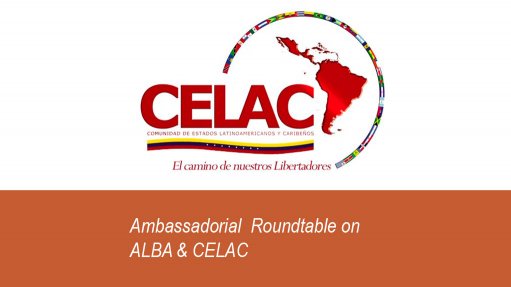
The Institute for Global Dialogue (IGD) associated with the University of South Africa (UNISA) held its first of a series of roundtable dialogues on Latin America and the Caribbean on 18 November 2015, branded as: “The IGD Ambassadorial Roundtable on ALBA and CELAC”. Significantly, this roundtable also brought together not only members from the diplomatic community of Latin America and the Caribbean but also representatives from academia, non-governmental sector and the government, particularly in the form of the Department of International Relations and Cooperation.
CELAC emerged out of a decision taken in February 23, 2010 at a unity summit of the Rio Group and the summit mechanism of Latin America and the Caribbean, in Riviera Maya, México, and formally launched on December 3, 2011 in Caracas, Venezuela. The launching of CELAC under the Bolivarian Presidency of the late Hugo Chavez also brought into focus the interregional and sub-regional integrating mechanisms already in place aimed at giving impetus to Latin American and Caribbean economic integration. ALBA, CARICOM, MERCOSUR, the Andean Community, SICA, UNASUR and other such integration efforts anticipated CELAC and served as reference for the creation of CELAC as the first region-wide mechanism.
For the first time in its history, the region of Latin America and the Caribbean inaugurated one sole organization, involving, without exception, all of its 33 sovereign states, reaffirming its character as a region, its quest for unity and integration, and its respect for diversity. Thus, the latter half of the first decade of the 21st century marked the emergence of a new multilateralism in Latin America and the Caribbean, accentuating the reversal of regional isolation between its components.
As part of IGD’s UNISA mandate to revive the Centre for Latin American Studies and progressively transform it into a Centre for Global South Studies within IGD, this roundtable series intended to introduce the local and international community in Tshwane and beyond to the dynamic multi-regional continental political, economic and cultural landscape of the Americas. As such this first roundtable highlighted major discussions: (1) the new generation multilateralism in the western hemisphere of the global south, represented in the emergence of the Community of Latin American and Caribbean States (CELAC) and the specific approach of the Bolivarian Alliance for the Peoples of Our America (ALBA) to the creation and strengthening of CELAC, and (2) competing region-building models. Other aspects that were also briefly discussed include: the linkages between Africa, Latin American and the Caribbean; a new status-quo and implications of Cuba-US relations; and aspects of the CELAC secretariat.